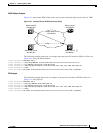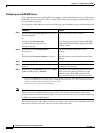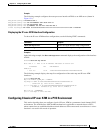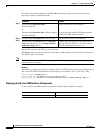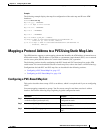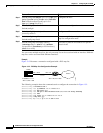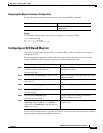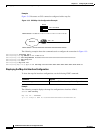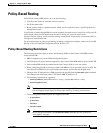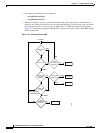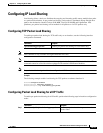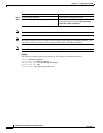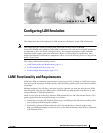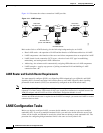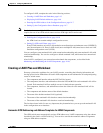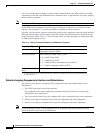
13-11
ATM Switch Router Software Configuration Guide
OL-7396-01
Chapter 13 Configuring IP over ATM
Policy-Based Routing
Policy-Based Routing
Policy-based routing (PBR) allows you to do the following:
• Classify traffic based on extended access list criteria.
• Set IP Precedence bits.
• Route specific traffic to engineered paths, which may be required to allow a specific QoS service
through the network.
Classification of traffic through PBR is based on standard or named Access Control Lists (ACLs) and IP
packet length. Some possible applications for policy routing are to provide equal access,
protocol-sensitive routing, source-sensitive routing, routing based on interactive versus batch traffic, or
routing based on dedicated links.
For more information on policy-based routing, including configuration examples, refer to the Cisco IOS
Quality of Service Solutions Configuration Guide, Release 12.1.
Policy-Based Routing Restrictions
The following restrictions apply to policy-based routing (PBR) on the Catalyst 8540 MSR and the
Catalyst 8540 CSR:
• PBR is supported only on the Enhanced Gigabit interface.
• The IP interface for egress must be supported by the Catalyst 8540 MSR and the Catalyst 8540 CSR.
• Fast-switched PBR cannot be enabled because the Catalyst 8540 is a line rate switch.
• When configuring IP QoS to rewrite precedence and PBR to rely on precedence set by an ACL, the
classification for PBR uses the original packet precedence, not the rewritten IP QoS value.
• Changes in the TCAM space for a PBR region must be specified with the sdm policy size command.
The changes take effect upon reboot. The default PBR TCAM size is 0.
• The following commands are supported:
–
match ip address {access-list-number | name} [...access-list-number | name]
–
match length min max
Note The IP packet length range supported in a route map is 0-1535. A maximum of three
non-overlapping length ranges are allowed per interface, including sub-interfaces.
• The following set command options are supported for PBR:
–
ip precedence
–
ip next-hop
–
interface
–
interface null0.
Note Due to platform limitations, the set interface null0 command does not generate an
“unreachable” message.



